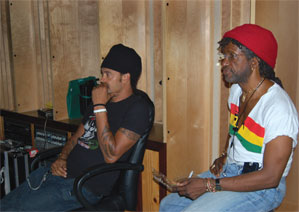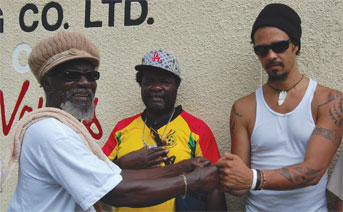| |
Taken from Relix (April 14, 2008)
MICHAEL FRANTI & SPEARHEAD
by Wes Orshoski
 Audibly giddy, Michael Franti reports that the recording of his forthcoming All Rebel Rockers found him feeling much like a member of the NBA All-Star team thanks to the backing of reggae’s most fabled rhythm squad, drummer Sly Dunbar and bassist Robbie Shakespeare (who produced the album with Franti). “It was a dream come true,” says the veteran musician-activist. Comprising the follow-up to his hailed 2006 disc, Yell Fire!, these sessions mark the first time Franti collaborated with the duo for an entire album. While Franti and Spearhead originally began All Rebel Rockers with Replacements/Faith No More producer Matt Wallace, he returned to the Caribbean in search of Sly and Robbie’s gold-plated groove, which has been applied to records by the likes of Bob Marley, Peter Tosh, Bob Dylan and Sinead O’Connor. “I wanted that groove and a toughness to the rhythm.” Audibly giddy, Michael Franti reports that the recording of his forthcoming All Rebel Rockers found him feeling much like a member of the NBA All-Star team thanks to the backing of reggae’s most fabled rhythm squad, drummer Sly Dunbar and bassist Robbie Shakespeare (who produced the album with Franti). “It was a dream come true,” says the veteran musician-activist. Comprising the follow-up to his hailed 2006 disc, Yell Fire!, these sessions mark the first time Franti collaborated with the duo for an entire album. While Franti and Spearhead originally began All Rebel Rockers with Replacements/Faith No More producer Matt Wallace, he returned to the Caribbean in search of Sly and Robbie’s gold-plated groove, which has been applied to records by the likes of Bob Marley, Peter Tosh, Bob Dylan and Sinead O’Connor. “I wanted that groove and a toughness to the rhythm.”
RECORDING JAMAICAN-STYLE
Working in Jamaica with Jamaican musicians is a different experience than I’ve had anywhere else, because in Jamaica the music is made to be put on a record. You don’t form a band, tour the country and make an album after three or four years of touring.
There, it goes the opposite way: You make a record first, and if the record is good enough—if it rises above the other records put out—you get to go out on the road. They make music to be listened to on a sound system, and not necessarily just to be played live.
 ANCHOR STUDIOS ANCHOR STUDIOS
We did the album at Anchor Studios in Kingston, which was so much like The Harder They Come. When I was there, Toots was there. Horsemouth and Countryman. “Chinna” Smith. And there’s always like ten guys on the sidewalk. Every time you drive in, they’re like, “Hey, mon, you need somebody come rhyme on your record, or play guitar?”
RECORDING WITH SLY AND ROBBIE
What will happen is, I’ll say, “Here’s the chords to the song—D and G, and the chorus is…,” and then Sly will start making a rhythm, and Robbie will close his eyes. It sounds like he’s just fumbling with the bass, making these weird sounds, and it’s just like, “Yo, I came here for a bassline, Robbie, come on, man.” After about ten minutes of fumbling, he comes out with these incredible basslines. He says the role of the bass is to get you from the drums to the melody—it’s supposed to connect the two. The drums don’t play the melody, and the melody doesn’t play the rhythm. You have to have something to connect the two. That’s what he’s a master at.
PIVOTAL MOMENTS
When we first got to Kingston, I had dinner with Sly and Robbie and I said to Sly, “I want the songs to be able to retain their emotion, but I want you to still be able to dance to ‘em. I don’t want songs that you just dance to or songs that you just listen to. I want ‘em to be both.” He just looked at me and said, “We make every song that way.” [Laughs] I was so excited that night, I couldn’t wait to get to the studio the next day. There was another time when I struggling with a couple songs, especially “All I Want is You,” which I had done on guitar first. I really liked it as an acoustic song, but every time we tried to put a beat to it, it just wasn’t happening. One day Sly and Robbie made this old-school, roots reggae, really heavy dub rhythm, and I started singing this really political song over it and Robbie came to me and says, “Mike, this rhythm is too sexy. You have to sing a love song on this one. So you got a love song?” So I took out “All I Want Is You”—which had completely different chords—sang it in one take, and it was magic.
RAPPING VS. SINGING
The mix is about half and half on this record. I don’t really think about it, because all of my songs come from an emotional core. I just think about whatever it is that I’m going through in my life that needs to get out. And I think that that’s when my songs are the most potent—when they’re coming from those moments where I’m like, “I can’t live unless I write about this.”
BEFORE YOU GO
The last song I wrote was a song about my son, Cappy, who’s now 20. He’s trying to get out in the world and find what he needs in his life. There was one night when he was about to get on a Greyhound to Las Vegas to meet up with his aunt and some friends. It was a really emotional moment for me, thinking about my son trying to figure it all out, and because that’s how I ended up in San Francisco—I took a Greyhound from my town and went to the big city, and it really altered my life. So that was a really emotional moment for me, and I wrote a song for him to listen to on the bus. I knew that he was leaving that night, so I stayed up all night, recorded the song and gave it to him the next day. He was really moved, and I feel like it’s something that brought us closer together.
|
|